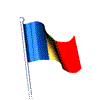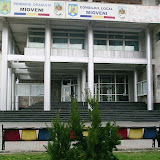marți, 17 iunie 2008
Happy Summer Holiday
HAPPY SUMMER HOLIDAY!
Friendship
The End of our project





 To the end of the project "Let's get to know ourselves and our cities" we can get the conclusion that we realized the aims established.
To the end of the project "Let's get to know ourselves and our cities" we can get the conclusion that we realized the aims established.a. To get a new view of the world around us
b. To empower young people with tools, the knowledge and skills they need to communicate in the future world
c. To deepen the relations among the European young people
d. To create background for further educational plans
e. To improve the command of English language
f. To be familiar enough with modern IC collaborative tools and to improve their use through developing blogs, WebPages or Power-Point Presentations
g. To experiment with new learning methodologies
h. To learn how to work in international teams
i. To know the cities, the schools, the likes and the dislikes of our partners and exchange ideas about the way young people live
j. To develop critical thought and explore the European perspective
k. To exchange information about cultural differences and similarities
l. To obtain intercultural knowledge, experience and computer literacy
m. To make friends in another country and, if it is possible, visit their cities
Students involved in this project worked in groups in France, Spain, Romania and Greece, introduced themselves to the others, described their family, the school environment and the educational system, discussed about their region and their city (architecture, houses within the sustainable development context, civilization, culture).
They exchanged ideas, suggestions, opinions, plans, designs, and images using IC tools.
They made crossword puzzles, riddles and diagrams trying to communicate and explain their customs, their interests, their hobbies and whatever they think their future will be like. They commented and published the thoughts and the opinions of their collaborators about studies at University or job via blogs, power-point presentations and web pages.
The students exchanged images, photos, videos and texts.
By working on the Internet and using ICT tools with the partners from other countries they have also realized the universal character of the Internet and its power.
Communication in English among students via ICT was very important.
sâmbătă, 17 mai 2008
The Sound of Music
In the Center of Pitesti, the residence of our county Arges, Romania there is a beautiful artesian well.
Listen the Sound and enjoy with this video!
Ciocarlia - Gheorghe Zamfirvineri, 9 mai 2008
EUROPE
Europe Day is celebrated on 9 May.
This event is in the calendar of most of the schools throughout the continent.
In this European Year of Intercultural Dialogue, teachers and students will in particular celebrate cultures, as an asset of European integration.
Today, the 9th of May has become a European symbol (Europe Day) which, along with the flag, the anthem, the motto and the single currency (the euro), identifies the political entity of the European Union. Europe Day is the occasion for activities and festivities that bring Europe closer to its citizens and peoples of the Union closer to one another.
It’s not them and us, it’s you and me.
DEMOCRATY
DIALOGUE
UNITED IN DIVERSITY
PROSPERITY
SOLIDARITY
PEACE
Art Photos
Gothic Art - Benjamín Novoa ( Polster)
Dimitris Milionis Enigma Art Gallery 2007
Le Corbusier, Architect
joi, 8 mai 2008
marți, 22 aprilie 2008
The Tulips' Symphony
With this occasion, Piteşti has tried to register a record, to be among other famous cities around the world.
More than 20 schools, as well as more than 5000 pupils from Piteşti and from the towns around it, have taken part into breaking an old record, dancing in the centre of the town for 3 or 4 minutes, wearing white T-shirts and fashionable jeans, their goal being to succeed in entering Guinness World Records.
The chosen theme was “the dance of the flowers”, being in harmony with this remarkable event.
Me and my pupils, we have visited the Exhibition of FLOWERS!
luni, 21 aprilie 2008
joi, 27 martie 2008
EARTH HOUR 2008

Earth Hour is a global initiative of WWF in which cities and communities will turn out their lights to symbolise their leadership and commitment to finding solutions for climate change. Cities from across Europe, North America, Asia and Asia Pacific, including Chicago, Copenhagen, Manila, Melbourne, Sydney, Tel Aviv and Toronto were named as the flagship participants in the WWF-led event on March 29, 2008.
Earth Hour will send a strong signal that people all around the world are deeply concerned and expect their leaders to take action before it’s too late,” Leape said. “Climate change is a global challenge that requires global solutions and it’s clear that the people of this planet are ready to get involved and find the answers.”
At 8pm local time on the 29 March millions of people in some of the world's major cities will use the simple action of turning off the lights for one hour to deliver a powerful message about the need for action on global warming.

Energy wasting - Lightbulbs destroyed
These are obsolete, but widely available, energy wasting incandescent lightbulbs. This type of bulb wastes 95 percent of its energy generating heat instead of light. This wasted energy mostly comes from burning fossil fuels like coal - causing climate change by adding carbon dioxide to our atmosphere.We crushed these bulbs in Berlin while EU and G8 ministers were meeting there for the, "Energy Efficiency: Shaping Tomorrow's World" conference to send them a message. Greenpeace is calling for national bans on energy wasting lightbulbs, and enforcement of an EU-wide mandatory efficiency standard on domestic lighting by 2010.
E "ora Pamantului", stingeti lumina!
Ora Pământului este pe 29 martie
Ora PAMANTULUI este un eveniment global creat pentru a simboliza că fiecare dintre noi, lucrând impreuna, poate avea un impact pozitiv impotriva poluarii si a schimbărilor climatice.
In engleza se numeste Earth Hour, 60 de minute in care stingem lumina pentru a marca astfel distrugerile climatice efectuate de catre om prin consumul nesabuit de energie
Programul "Ora Pamantului" a fost iniţiat in 2007 in Sydney, Australia de catre World Wide Found for Nature, iar in 2008 va fi un eveniment global. Anul trecut in Sydney s-au stins luminile in peste 2,2 milioane de locuinţe si in peste 2.100 de companii, astfel consumul de energie a fost redus cu 10% în acest interval orar.
In 2008, oraşe din toată lumea se vor alătura pentru a stinge luminile timp de o ora simbolizand astfel participarea lor la căutarea soluţiilor care să prevină schimbările climatice. Luminile vor fi stinse in cladirile simbolice, in sediile companiilor, restaurante.
Sâmbătă, 29 martie de la ora 20, timp de o oră, fiecare dintre noi poate marca acest eveniment prin stingerea luminilor, oprirea calculatorului si chiar schimbarea becurilor incandescente cu cele eficiente energetic (becurile fluorescente), pentru protejarea naturii. Ar fi momentul să arătăm că si nouă românilor ne pasă de mediul înconjurator si ar trebuie să luam parte la aceasta manifestare mondiala.
luni, 25 februarie 2008
CONGRATULATIONS!
Congratulations! You have been just awarded with the Quality Label for
the work you have done in eTwinning.
Also, we congratulate the Romanian team of the "Liviu Rebreanu" School from Mioveni, Arges, Romania because they had been awarded with the corresponding eTwinning Quality Label for the project "Let's get to know ourselves and our cities".

joi, 21 februarie 2008
Nicolae Grigorescu - a famous Romanian painter
ROMANIAN WRITERS
sâmbătă, 16 februarie 2008
duminică, 10 februarie 2008
miercuri, 16 ianuarie 2008
ENVIRONMENT
Here are a few suggestions in order to stop without a great effort the damaged impact these products have upon the environment.
The students from "Liviu Rebreanu" School, Mioveni, Arges, Romania have participed to the activities dedicated to The Earth Day.
duminică, 13 ianuarie 2008
luni, 7 ianuarie 2008
Waste management (WORD SEARCH)
The Choreographic Folklore
1. The Reel
The reel is considered to be:
- a dance of the village;
- a generally dance;
- a dance in a circle;
- a song of dance;
- the shouting ;
- the generic term of the Sunday party when the young people gathered together in order to dance.
The most spread were: Boiereasca, Rata, Banu Maracine, Baraboiul.
Little leave chicory of hill,
What nice is to dance in a reel,
And little leave I call again
Let’s play in circle the reel then!
2. Sarba
a) Sarba from Muscel, Sarba of the Priests or Lozeasca are dances which are played with the people set under a shape of a snail, in opened or closed circles, generally with pairs in the middle, the players dancing with changed or combined steps.
Dance my dear, let’s feel free,
Or don’t you like to dance with me?
‘Cause if I play even lonely,
And the board broken will be.
b) Sarba in two parts: Simianca, Sarba of 22, Sarba of Wedding, Chindia – the steps are simple, laterally executed, crossed in front or behind, as well as combined.
Do you know it easily?
Like in Muscel family
Like in grape leaves, not in pizza
It’s a dance from Racovitza.
3. Braul
- The Old Brau, The Little Brau, Slanicul, The Hard Brau, The on Three Brau, The on Six Brau. They are generally played by men, disposed in rows, half-circles, even in line, with a classic position of arms, in chain of arms on the shoulder or crossed in back; this kind of dance is executed with combined movements, sometimes strongly pressed and followed successfully by movements of feet in specific saults.
Here is the “brau’ nice dance
Pass the river with chance,
And so does my pretty girl
Whose hair is long and curl.
That who is going to stop
Many bottles he will drop,
And full barrels must to fill
For my darling it isn’t bill!
Traditions and Customs
The folk costumes worn in Mioveni are related to those of Muscel area by well defined origins; they impress by the variety of the decorating motifs realized in a rich color manner, proving the love for beautiful of the people who settled their houses on the feet of the Carpathians.


The Literary Folklore
The ballad “Anghel’s Radu” is a part of the outlaw’s folklore, around this character a lot of legendary structures could appear. The outlaw had a heroic conduct and it has created folk themes connected to the fight for the social justice, the outlaws’ deeds, the betrayal, suppositions related to the outlaws’ treasures.
The Carpentry - old custom
Along over the five centuries of existence of Mioveni, the carpentry was the activity due to which the inhabitants of this place have become known.
The pots didn’t miss from the houses of the inhabitants because in them the selected drinks were placed, the most desired being the wine and “tuica”.
The carpentry was given from generation to generation. Besides the closed barrels, in which the liquids could be carried, the carpenters have also made some specia ones, slowly closed, in which products as flour, maize, wheat or even pins.


























